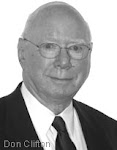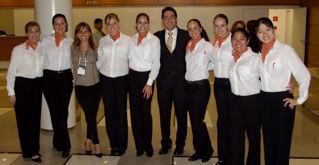
This week I have had the pleasure to meet Dr. Edward Hoffman here in Sao Paulo. Dr. Hoffman is a professor at Yeshiva University in New York and author of such interesting books as "The Right to Be Human", the only biography of Abraham Maslow, "Future Visions - The Unpublished Papers of Abraham Maslow" and "Psychological Testing at Work". I first met Dr. Hoffman in cyberspace in the Employee Engagement Network shortly after creating this blog last year. We share many interests but most importantly the joy of being married to a Brazilian woman! For me, this is a very nice example of how small the world has become thanks to Internet, blogs and social networks.
For someone like me, author of a blog that has a lot to do with personality (testing) and concepts similar to Maslow's self-actualization and Drucker's writings, this was of course a most interesting meeting, and with the agreement of Dr. Hoffman, I would like to share with you a couple of key insights.
Abraham Maslow (1908-1970) was born in New York, the eldest of seven children of Russian immigrant parents. As a young man, he displeased them greatly by choosing to study psychology rather than law.
Maslow was described by Drucker and others as the "the father of humanistic psychology". Drucker said about Maslow's work: "it had a lasting impact on me. I became an immediate convert--Maslow's evidence is overwhelming. But to date very few people have paid much attention."
I quote the front flap of Dr. Hoffman's biography:
"More than any other American-born psychologist in the last half-century, Maslow has powerfully affected the way we think about ourselves. He advanced an entirely original concept of human nature - the hierarchy of inborn needs - that turned psychology on its heels. In contrast to classical approaches that studied human weaknesses and neurosis, Maslow focused on healthy, exceptional, high-achieving individuals."
It is here where I see the most striking parallel to the work of Donald Clifton and the ideas behind the strengths revolution, for Donald Clifton also focused his work on defining what is good about people, instead of what is wrong. As a consequence, he is considered as the grand-father of what became to be known as positive psychology.
The key idea behind the "strengths revolution" is that we should focus much more on developing our strengths than compensating our weaknesses. This may seem obvious or easy, but it often isn't, for we are usually pretty bad at identifying and spelling out our talents, and we underestimate the effort it takes to develop them into real strengths. As far as I know, the American psychologist Donald Clifton (1924-2003) essentially developed this idea, although Peter Drucker seems to have written something similar more or less around the same time. Clifton also developed a taxonomy of 34 talents and a test to assess them. In honor to this man's contribution to these ideas and indirectly to my life, I use his name in the title of this blog.
Yet I am starting to suspect that Donald Clifton may have been influenced by Abraham Maslow's work. And if that was the case, I feel compelled to point this out in my blog. So an important question I made to Dr. Hoffman was whether he is aware of any contact or communication between Maslow and Clifton. But this was apparently not the case. But considering Maslow's influence in the field of psychology at the time when Donald Clifton started his studies, it is safe to assume that Clifton must have read some of Maslow's articles.
Among students of business administration and managers, the most well-known concept of Maslow is probably the "hierarchy of needs" with physiological needs at the bottom, followed by need for safety, belonging, esteem and with self-actualization at the top.
I quote The Economist's "Guide to Management Ideas and Gurus" (p. 268):
"Self-actualization, at the top of pyramid of needs, is the state that has most fascinated followers of Maslow. What is it? Who has achieved it? Maslow helped a bit by giving a list of people he felt had reached self-actualization: Abraham Lincoln, Thomas Jefferson, Albert Einstein, Eleanor Roosevelt, William James, Albert Schweitzer, Benedict Spinoza and Aldous Huxley...""He then helped by further describing what it was that motivated people at this level. These people, he claimed, sought after truth, rather than dishonesty; uniqueness, not bland uniformity; completion, rather than incompleteness; simplicity, not unnecessary complexity; playfulness, not grim, humorless, drudgery; and self-sufficiency, not dependency".
I am still in the process of learning more about Maslow's ideas, especially with regard to management and self-actualization. But to me, the word "self-actualization" has always had the connotation of realizing one's innate potential, like talents. Thus, I asked Dr. Hoffman to what extent Maslow might have anticipated many of the ideas of Donald Clifton and Peter Drucker with regard to talents and strengths. Somewhat to my surprise, I learned that this was only marginally the case, such as in the idea of seeking uniqueness, not bland uniformity. But overall, developing strengths was not exatly a corner stone of Maslow's ideas about self-actualization.
Next, I asked Dr. Hoffman what he would recommend to a manager or entrepreneur who would like to foster a culture of self-actualization, also referred to as "enlightened management". To my surprise, Dr. Hoffman's top of the mind answer was the importance of workplace esthetics: pleasant, beautiful office buildings and decoration plays an important role to stimulate self-actualization. But of course, there is more to it, most importantly the freedom to effectuate one's own ideas, try things out, make decisions, and make mistakes.
These ideas remind me very much about the findings of Gallup's extensive research about effective leadership as summarized in the book "First Break All the Rules": Great leaders respect the individuality of their employees, their unique "configuration" of strengths and weaknesses. As a consequence, they resist micromanaging, and define desired outcomes rather than the steps how to get there.
That involves an above-average amount of freedom and tolerance to mistakes. It means that a job, especially a managerial job, has to be "large". Let's listen to Peter Drucker in his book "Management" (p.406):
“The most common mistake (in designing managerial jobs) is to design the job so small that a good man cannot grow. … If a job is designed so small that the incumbent can learn everything in a few years, the majority of managers will be frustrated, bored, and no longer working. They will, so to speak, “retire on the job”. They will resist any change, any innovation, and new idea, for change can only be a change for the worse for them and threaten their security. Knowing well that they are not actually contributing any more, they are fundamentally insecure.”
Let's note that this was probably first written around 1973. Now let's fast forward to the year 2004 and read an article in USA Today:
"The majority of workers are what Gallup calls ROAD Warriors — retired on active duty. Gallup says its research has unearthed 12 questions, called the Q12, that separate ROAD Warriors from those who are “engaged” with their work. Engaged workers give more “yes” answers to questions such as “At work, do I have the opportunity to do what I do best every day?”"
The common theme here: "retired on the job". We could also say "disengaged". Gallup surveys show that only 28% of workers in the U.S. are engaged, and that 17% are actively disengaged. Of course, this has many different reasons, but I believe that an important one is the fact that jobs are too narrow for self-actualization and as a consequence, people retire on the job.
In other words, I see an important connection between Maslow's self-actualization, Drucker's "large" managerial jobs, Donald Clifton's strengths revolution and Gallup's research on employee engagenemt. Note that I am not a scholar in these fields, just a humble manager on a journey in these most interesting intellectual land.
It is interesting to note the many similarities between Gallup's Q12 and Maslow's hierarchy of needs, like "I know what is expected of me at work" (Security), "In the last seven days, I have received recognition or praise for doing good work" (Esteem), "My supervisor, or someone at work, seems to care about me as a person" (Belonging), "I have a best friend at work" (Belonging), "This last year, I have had opportunities at work to learn and grow" (Self-Actualization).

Gallup uses also a pyramid to group the twelve Q12 questions into four essential groups (see picture on the left; click here for further information).
You may be interested in the Hoffman Vocational Value Scale, which measures job satisfaction and is rooted in Maslow's hierarchy of needs.
In conclusion:
Does it surprise that so much is being talked about innovation these days, but so little seems to be accomplished in most conventional companies?
Does it surprise that so many companies these days complain about the shortage of talent and have to "buy in from outside"? Some companies go to great lengths in order to attract talent, from revamping the corporate websites to expensive recruiting events to polishing up their image with all kinds of social responsibility and P.R. "stunts". But I dare to say that most of this really misses the point.
The concepts of self-actualization and enlightened management, as "esoteric" as they may seem to be first, may be more relevant than ever in today's world! However, Dr. Hoffman points out that Maslow's writings on management tend to raise more questions than to give all the answers (see for example Maslow's book "Maslow on Management"). But we should have learnt a lot more about management since Maslow died in 1970, not at least thanks to Peter Drucker and the Gallup research, as well as the avalanche of books about leadership in recent years. The problem now is -as always- to put it in practice!
For further reading about Maslow and strengths, I recommend this post on the Strengths Academy site.







0 comments:
Post a Comment